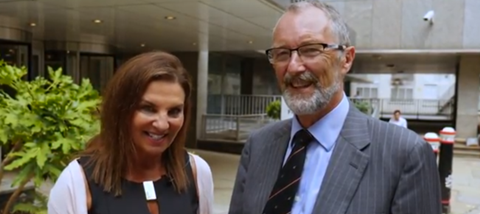
As a barrister, friends will often ask me "do you think she did it?" about cases in the media.
I remember the case of ‘Foxy Knoxy’; seeing the look in her eye from the photos, I may have been tempted to jump to conclusions about Amanda Knox. That’s natural. But as a Christian and as a lawyer, I'd always reply, "I don’t know. It wasn’t my case, and I don’t know the facts."
Because the truth is, unless you are familiar with the case (not to mention the court system and jurisprudence) it is very easy to jump to the wrong conclusions.
Richard Page was a magistrate – a first tier, volunteer judge – who was part of an adoption panel, helping determine if would-be parents were suitable to adopt vulnerable children.
A case was brought before him where a same-sex couple sought to adopt a child. He was presented with what we now know to be misleading evidence that same-sex couples provide a better environment for vulnerable children than heterosexual couples. In a closed-room discussion with other magistrates, he used his common sense to question the accuracy of the evidence brought before the panel. In the end, he voted against the placement – and has since explained his reasoning: one of the would-be parents had previously had a failed adoption application. He suspected the couple was ‘adoption shopping’ in England where the process is easier. Also, the child’s foster parents, a young married couple of nearly three years, wanted to adopt the child.
A case can only be decided on the evidence that is brought before it. However, every person deciding a case, are required to apply their collective experience and their common sense to the facts of a case. Immediately before a jury retires, that is what a judge will tell a jury to do, and that is exactly what Richard was doing. Common sense and his prior knowledge told Richard to distrust the evidence.
Take the recent case of ‘RS’, a Polish citizen living in the UK who had a sudden heart attack and went into a ‘minimally conscious state’. Despite continued treatment being offered – and prospects of living, and possibly substantially recovering – a judge ruled that it was in his best interests to die, determining that starvation and dehydration would be more comfortable than a helicopter trip to Poland. The judge applied his experience of the world – as wrong as I believe that is – to override the right to life of ‘RS’.
Christians ought not to be naïve about how the justice system works – or doesn’t.
None of us is perfect, including judges. Deliberately or accidentally, the effects of our imperfections and fallenness runs up through institutions. While Peter Ould wants to present legal judgments as the unbiased statement of unquestionable truth, Christians ought to recognise they have limitations.
After his dismissal as a magistrate, Richard was invited to take part in a television program to point out that those who share his beliefs are being pushed out of key roles as public servants. They cannot support ideas and practices in their workplaces that go against their Christian conscience and end up essentially barred from involvement in key roles serving the public. We see this reality time after time at the Christian Legal Centre – we had 103 requests for help in February - many times managing to quietly resolve the situation but sometimes having to pursue justice in the courts.
Following Richard’s interview, the NHS Trust where Richard served as a non-executive director forced him out of his role. The Court of Appeal judgment summarises the employment tribunal’s finding that Richard “had expressed views about same-sex adoption and homosexuality more generally which were liable to impact on the Trust’s ability to engage with gay service-users”. The logic of the ruling is that Richard was expressing his Christian beliefs and that he was entirely free to do so – but that it caused the NHS trust a problem and it was within its rights to force him out.
Do you know the non-executive directors of your NHS trust? Do you know what views they might hold? Maybe you’d be more likely to know if they had recently been berated on TV by Piers Morgan, but it’s an enormous stretch to suggest that this would have any real impact on people’s ability to access services. Richard worked (with great success) on the trust’s finances – it is not as if his views on same-sex adoption or homosexuality would have had any effect on the work he was doing.
Richard had become a marked man. People knew what he believed, didn’t like it and picked on him.
Suppose one of your NHS directors were a staunch supporter of abortion at any stage for any reason (this is not hard to imagine). And a group of people wrote to the trust saying they didn’t feel like they could safely access treatment or work with the director due to their extreme views. What are the chances that director would lose their role? Nil. For a starker example, imagine Richard had come out as gay in the media and some people complained. Would it have been fine for the trust to get rid of him?
This is viewpoint discrimination. It opens the door for employers to dismiss a Christian who has exercised their right to free speech, as long as they can cite tenuous reasons about how an outraged mob might cause them problems.
Getting the truth told straight in and out of court is a messy business. But I am not for flinching. I am determined to continue to stand for the freedom of Christians like Richard, even when "justice is driven back" (Isaiah 59:14).




























